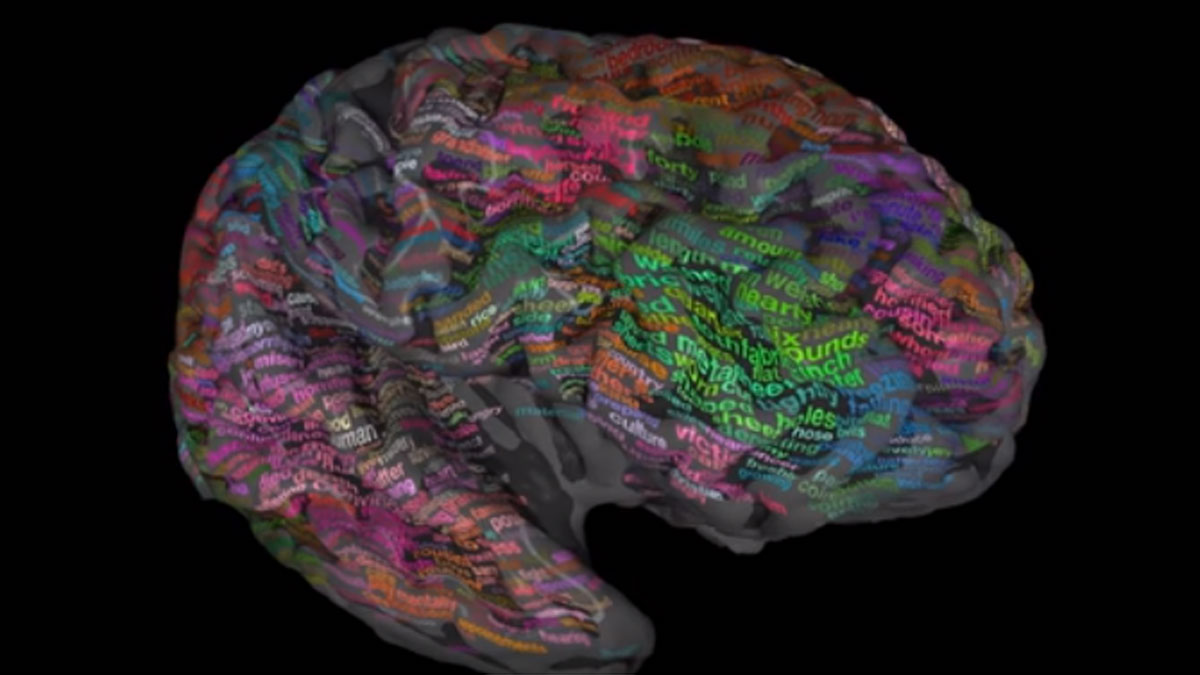'Neural atlas' of the brain shows how we process words
New map could allow for instantaneous language translation in the future

A free daily email with the biggest news stories of the day – and the best features from TheWeek.com
You are now subscribed
Your newsletter sign-up was successful
Scientists have created a "neural atlas" of the brain that shows how the meanings of words correspond to different regions.
The map, created by neuroscientists at the University of California, Berkeley, displays how each word triggers reactions in specific parts, turning spoken language into intricate patterns of meaning.[[{"type":"media","view_mode":"content_original","fid":"94238","attributes":{"class":"media-image"}}]]
"Our goal was to build a giant atlas that shows how one specific aspect of language is represented in the brain, in this case semantics, or the meanings of words," said researcher Jack Gallant.
The Week
Escape your echo chamber. Get the facts behind the news, plus analysis from multiple perspectives.

Sign up for The Week's Free Newsletters
From our morning news briefing to a weekly Good News Newsletter, get the best of The Week delivered directly to your inbox.
From our morning news briefing to a weekly Good News Newsletter, get the best of The Week delivered directly to your inbox.
Scientists recorded the brain activity of English-speaking volunteers while they listened to stories read out on The Moth Radio Hour, a US radio show. They then cross-referenced the words of the stories with the brain activity of each participant to show how groups of similar words triggered similar responses in more than 50,000 pea-sized spots all over the brain.
They believe that the map could allow clinicians to track the neural activity of patients who have difficulty communicating and then match that data to semantic language maps to determine what they are trying to express. It could also potentially allow for an implant that decodes brain signals into different languages as a person speaks.
"It is possible that this approach could be used to decode information about what words a person is hearing, reading or possibly even thinking," said study author Alexander Huth.
"Described as a 'tour de force' by one researcher who was not involved in the study, the atlas demonstrates how modern imaging can transform our knowledge of how the brain performs some of its most important tasks," says The Guardian.
A free daily email with the biggest news stories of the day – and the best features from TheWeek.com
"The data is certainly intriguing," Susan Bookheimer, a neuroimaging expert in Los Angeles, told The Wall Street Journal. "It's suggestive, but much more work is needed to understand what it means."
-
 The ‘ravenous’ demand for Cornish minerals
The ‘ravenous’ demand for Cornish mineralsUnder the Radar Growing need for critical minerals to power tech has intensified ‘appetite’ for lithium, which could be a ‘huge boon’ for local economy
-
 Why are election experts taking Trump’s midterm threats seriously?
Why are election experts taking Trump’s midterm threats seriously?IN THE SPOTLIGHT As the president muses about polling place deployments and a centralized electoral system aimed at one-party control, lawmakers are taking this administration at its word
-
 ‘Restaurateurs have become millionaires’
‘Restaurateurs have become millionaires’Instant Opinion Opinion, comment and editorials of the day
-
 Epstein files topple law CEO, roil UK government
Epstein files topple law CEO, roil UK governmentSpeed Read Peter Mandelson, Britain’s former ambassador to the US, is caught up in the scandal
-
 Iran and US prepare to meet after skirmishes
Iran and US prepare to meet after skirmishesSpeed Read The incident comes amid heightened tensions in the Middle East
-
 Israel retrieves final hostage’s body from Gaza
Israel retrieves final hostage’s body from GazaSpeed Read The 24-year-old police officer was killed during the initial Hamas attack
-
 China’s Xi targets top general in growing purge
China’s Xi targets top general in growing purgeSpeed Read Zhang Youxia is being investigated over ‘grave violations’ of the law
-
 Panama and Canada are negotiating over a crucial copper mine
Panama and Canada are negotiating over a crucial copper mineIn the Spotlight Panama is set to make a final decision on the mine this summer
-
 Why Greenland’s natural resources are nearly impossible to mine
Why Greenland’s natural resources are nearly impossible to mineThe Explainer The country’s natural landscape makes the task extremely difficult
-
 Iran cuts internet as protests escalate
Iran cuts internet as protests escalateSpeed Reada Government buildings across the country have been set on fire
-
 US nabs ‘shadow’ tanker claimed by Russia
US nabs ‘shadow’ tanker claimed by RussiaSpeed Read The ship was one of two vessels seized by the US military